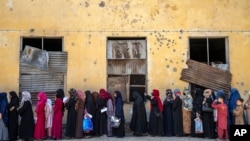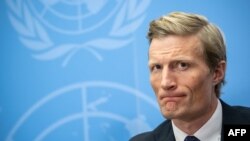The deputy executive director and chief operating officer for the U.N. World Food Program, Carl Skau, says that Afghanistan is facing a dire humanitarian situation with nine out of 10 Afghan families lacking adequate food and “children and pregnant women are the hardest hit.”
In an interview Wednesday with VOA via Skype, Skau said that the humanitarian situation in Afghanistan is “dire,” adding that WFP, the world’s largest humanitarian organization, would need $1 billion “to get through” the winter.
“We have so far only managed to mobilize some 10% of that,” Skau told Waheed Faizi of VOA’s Afghan Service.
Skau, who visited Afghanistan last month, said that one of the main challenges for his organization is to reach the most vulnerable groups, especially women and children, in Afghanistan, adding that the Taliban’s “bans on women working for us are complicating that.”
The interview has been edited for brevity and clarity.
VOA: Could you please share some information about what you saw during your recent travel to Afghanistan?
Carl Skau: I visited both Kabul Province and Parwan Province. I managed to see both urban and rural contexts. And I guess one takeaway is that the situation continues to be desperate. But also, I was impressed by the resilience of the Afghan people, not least of the women, and their commitment and determination to move forward. I also saw how WFP’s work is making a difference. And how, despite the complicated and difficult operating environment, we are finding ways to deliver to people. The message from the people, and especially the women I spoke to, was clear, that, ‘Do not leave us. You must continue to deliver,’ and we are determined to continue to stay and deliver. But the biggest issue for us now is the lack of funds.
VOA: If the World Food Program is unable to fully fund this year’s aid request, what is the “plan B” for helping people in Afghanistan?
Skau: Well, there isn't really a Plan B. We need to find a way to fund our operations. We were quite well funded by the end of last year. That's how we help get through the winter. We reached some 20 million people, almost half the population. We delivered food to 13 million people in December, January and February. We had to scale that down to some eight million in March. And now we have made further cuts to five million in May. So, we are now turning every stone, knocking on every door to see how we can mobilize funds in order to scale up back again as we face winter. We are also looking at different funding sources, including more development funds. But there is no plan B. We will need donors to step up and fund us like they did last year if we're going to manage to get through the next winter.
VOA: How much funds does the WFP need to help people in Afghanistan?
Skau: Well, we're looking at almost a billion U.S. dollars to get through the next winter. We have so far only managed to mobilize some 10% of that. So, you know we need some serious injection of funds in order to be able to do what we did last year, which really brought us through the winter, averted famine and helped stabilize the situation.
VOA: There are concerns about the distribution of humanitarian assistance in Afghanistan. Some people say that, in some areas, the Taliban interfere with the distribution and get assistance for themselves. Any instances?
Skau: Now, I can't speak to any evidence of that, but there are challenges, of course, and mainly, I would point to these latest bans or banning women from our workforce. We need to ensure that women have the same access and that there is no discrimination against women in accessing our assistance. For that, we need women to be working in our operations, including in assessing what the needs are, identifying beneficiaries, including women-headed households, but also to monitor and follow up and make sure that assistance has reached those it was intended to so that is indeed a challenge. We're finding ways around it. But certainly, that's one of our main concerns now going forward.
VOA: You mentioned female workers, are females working for WFP currently?
Skau: We have not laid off any women or replaced any women with men. In some provinces, they are working in different functions, and we're finding different ways around it. But that's important for us. There are two parts to this. One is to ensure that there is no discrimination against women in our programs, in our delivery of assistance. And we are working with safeguards to ensure that happens. The second part is to ensure we can maintain the level and ratio of women working in our workforce. Those two are overlapping, but they're not completely overlapping. But we're actively working on both fronts, and of course, these ladies’ edicts are not helpful, and, you know, we are encouraging the authorities as we meet them to change this to go back to how it was previously where women could freely work in the distribution and follow up of our assistance.
VOA: You mean that female staff of WFP are still banned from working in Afghanistan?
Skau: Well, there have been these edicts. There are different ways of interpretation and implementation. And so, we are finding ways to keep our women working for WFP. And as I said, that will be a key principle and condition for us. We will not lay off any women because of these edicts, nor will they be replaced with men.
VOA: How many people are in need of humanitarian assistance in Afghanistan?
Skau: You know, there are many people because the country has gone through 20 years of war. They are now in a near collapse of the economy. And so, you know, normal people in Afghanistan are not able to cope without international assistance. I think our calculation is that 9 out of 10 Afghan families are unable to feed themselves adequately. And children and pregnant women are the hardest hit. So close to half of the population faces a crisis or emergency level of food insecurity. This year alone, there is a 30% deficit in wheat production. So yeah, the situation is dire. And now we're bracing for a cruel winter. It will be the third successive winter with limited food and heating. And so we really need to step up our support to the vulnerable people.
VOA: What are the main concerns for WFP in Afghanistan?
Skau: Well, number one would be the ability to reach the most vulnerable and to reach women. These bans on women working for us are complicating that. And so having to find ways around is, of course, not a sustainable way forward. So that would be my number one to be able to independently and impartially access the most vulnerable, including women and children. That will be number one. Number two, and frankly, that's related to number one, is our ability to raise funds funding is our number one concern at the moment. But that is indeed related to number two because as long as donors are not confident that we can independently reach the most vulnerable, it will be much harder for us to mobilize the funds needed.
Roshan Noorzai from VOA's Afghan Service contributed to this report, which originated in VOA's Afghan Service.





